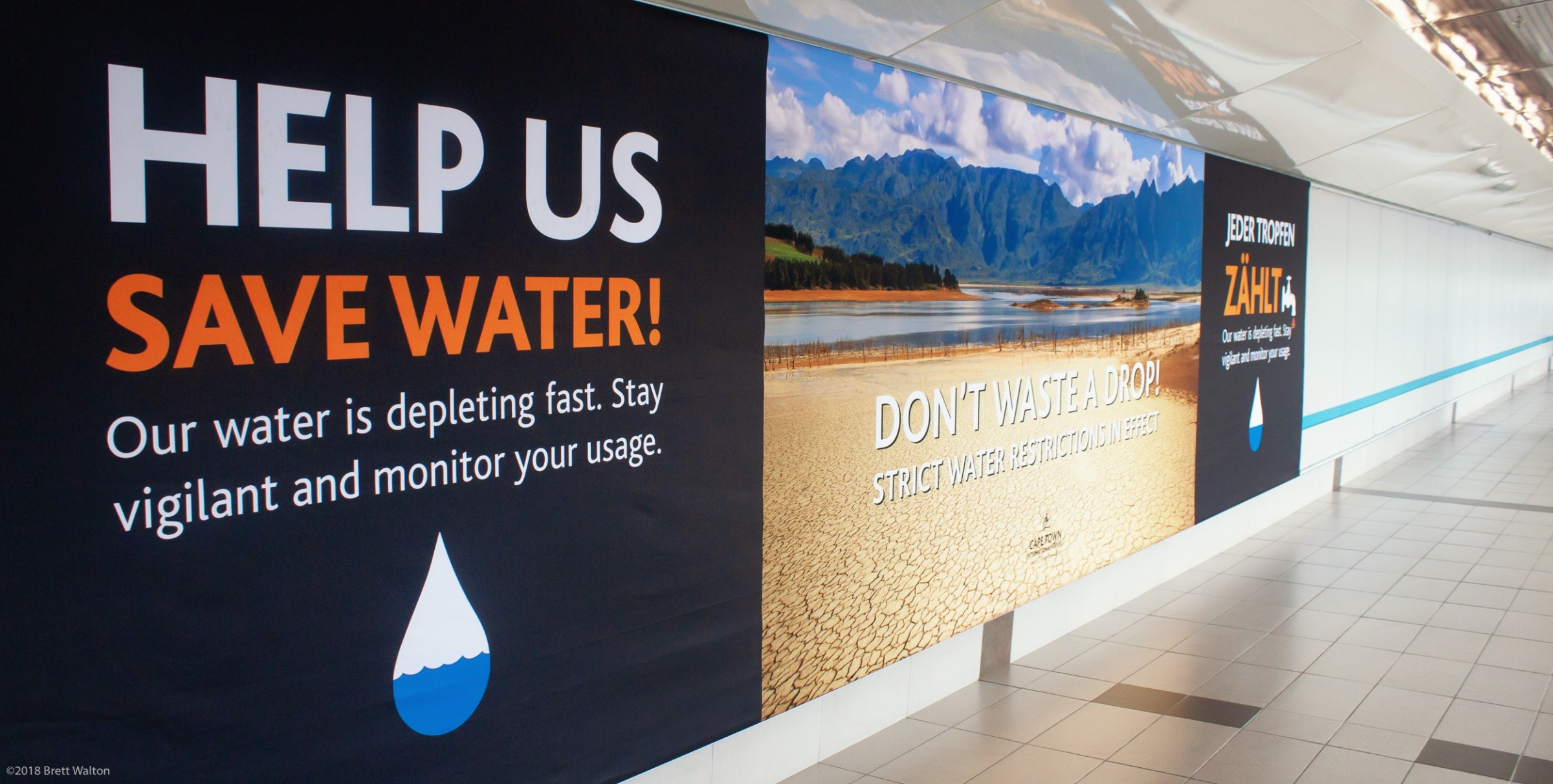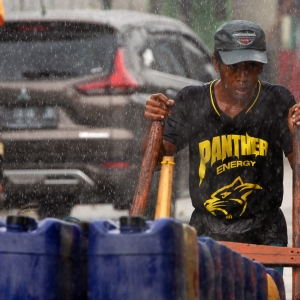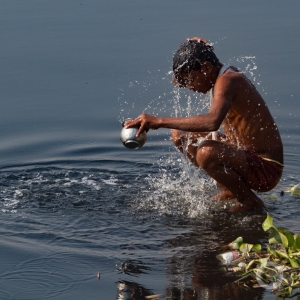The Stream, August 23, 2023: Monsoons and Flooding Buoy Illegal Wildlife Trade in Bangladesh

Visitors arriving at Cape Town’s airport in 2018 were greeted with warnings about the city’s water crisis. Photo © Brett Walton / Circle of Blue
YOUR GLOBAL RUNDOWN
- South Africa, one of the world’s driest countries, looks to privatize its water market.
- Mexico announces more than one dozen new national parks and protected areas aimed at conserving rainforests and rivers on both its coasts.
- A new study has found that wet seasons in Bangladesh are contributing to increased, illegal trading of wildlife.
- In a historic referendum, Ecuadorians have voted to block oil drilling in Yasuni National Park, one of the most diverse Amazonian biospheres.
In Ho Chi Minh City, where canals are filled with black, oozing sludge, volunteers are taking cleanup efforts into their own hands — literally.
“I use three layers of gloves.” — Nhu Van Hoa, a cleanup volunteer.
Hundreds of people throughout the Vietnamese city take to blackened canals between three and five times per week to remove garbage from the thick, polluted waters which stretch through its districts, Al Jazeera reports. The volunteers, mainly students and young people, wade into the mess in borrowed waterproof gear, their spirits high despite the stench and rotting atmosphere.
Ho Chi Minh City, which produces about 9,500 tons of waste per day, does not have a formal recycling program, and its two landfills are “reaching capacity,” according to Al Jazeera. As a result, the volunteers often ask the local government which locations are most in need of their services.
To protect their own health, aside from wearing many layers of equipment, the volunteers are required to stay up to date on their vaccinations “for as many diseases as possible.” Stepping on loose needles, touching bare skin to the water, or simply inhaling too many fumes can cause rashes, infections, and organ damage.
Over the past four to five months, the volunteers have cleaned more than 100 canals.
— Christian Thorsberg, Interim Stream Editor
Recent WaterNews from Circle of Blue
- Benton Harbor: Safe Water Is Still a Luxury — Lead pipes replaced but residents struggle with high water bills.
- Illinois is Losing Water — Leaky pipes must be replaced. But where to get the money?
The Lead
The killing and trading of wildlife, illegal in Bangladesh since 2012, nonetheless spikes during the country’s wettest months — summer and into fall. That’s when monsoon rains put those in flood-prone areas at risk, the unemployment rate increases, and authorities are occupied or stalled with water-related safety concerns, Mongabay reports.
This finding, published in the journal Oryx, links increases in the illegal wildlife trade to seasonal, wet, often dangerous weather. With less oversight during this time, and people desperate to make ends meet, some turn to the “hunting and wildlife trade as an alternative source of income.”
The trade strains government resources, Mongabay reports. From June 2020 to June 2023, Bangladesh’s wildlife police “seized more than 16,000 wild animals and 264 trophies in 1,726 operations. It also pursued 33 cases against those involved in the trade, disciplining 38 people for illegally catching wild animals and selling them in wildlife markets, according to Forest Department data.” Those numbers, likely an undercount, only hint at the scale of the trafficking.
Complicating conservation efforts, many tribal communities have long hunted and eaten native species which today are considered protected. Properly policing the trade, even when resources are not stretched thin, remains a challenge for local governments.
This Week’s Top Water Stories, Told In Numbers
55,920
Barrels of oil per day that will no longer be extracted from Yasuni National Park after a nationwide referendum in which Ecuadorians voted to stop drilling in the biosphere, CBS News reports. The vote was 59 percent to 41 percent. Yasuni, which comprises 3,800 square miles within the western Amazon Rainforest, “is home to three of the world’s last uncontacted Indigenous populations and a bounty of plant and animal species.” The Napo and Curaray rivers meander throughout much of the preserve, and several other streams and tributaries flowing directly into the Amazon. The vote will dent state revenues, though. According to CBS, “the government of outgoing President Guillermo Lasso has estimated a loss of $16 billion over the next 20 years.”
13
Number of new protected areas announced in Mexico, which together comprise 44,276 acres, Mongabay reports. The six new national parks and seven “flora and fauna protection areas” will conserve thousands of acres of rainforests and biodiverse riparian habitats across the country. The new protected areas stretch as far east as the Yucatan Peninsula, and as far west as Sinaloa. The government has also said that it will be announcing three more protected areas by the end of August.
On the Radar
One of the world’s 30 driest countries — a consequence of both drought and aging infrastructure — South Africa may be looking at the private sector to secure its water future. Bloomberg reports that the country’s leadership is considering holding bid rounds for “desalination plants and water reuse projects,” and billions of dollars have already been set aside to fund such ventures.
More Water News
Bald Cypress: The health of cypress swamps in southern Louisiana is being jeopardized by hurricanes, saltwater flooding, and erosion, Yale Climate Connections reports. To help with restoration efforts, community partners are giving volunteers the chance to nurse and then plant cypress saplings, which act as natural flood barriers.
North Korea: The recent seawater flooding of 560 acres of land in North Korea — nearly half of which are rice paddy fields — has occurred as a result of erosion and “inadequate drainage systems,” Reuters reports. As a result, leader Kim Jong Un has “lashed out at top officials.” Meanwhile, international experts are concerned that the flooding coincides with food shortages throughout the country.
Christian Thorsberg is an environmental writer from Chicago. He is passionate about climate and cultural phenomena that often appear slow or invisible, and he examines these themes in his journalism, poetry, and fiction.






Leave a Reply
Want to join the discussion?Feel free to contribute!